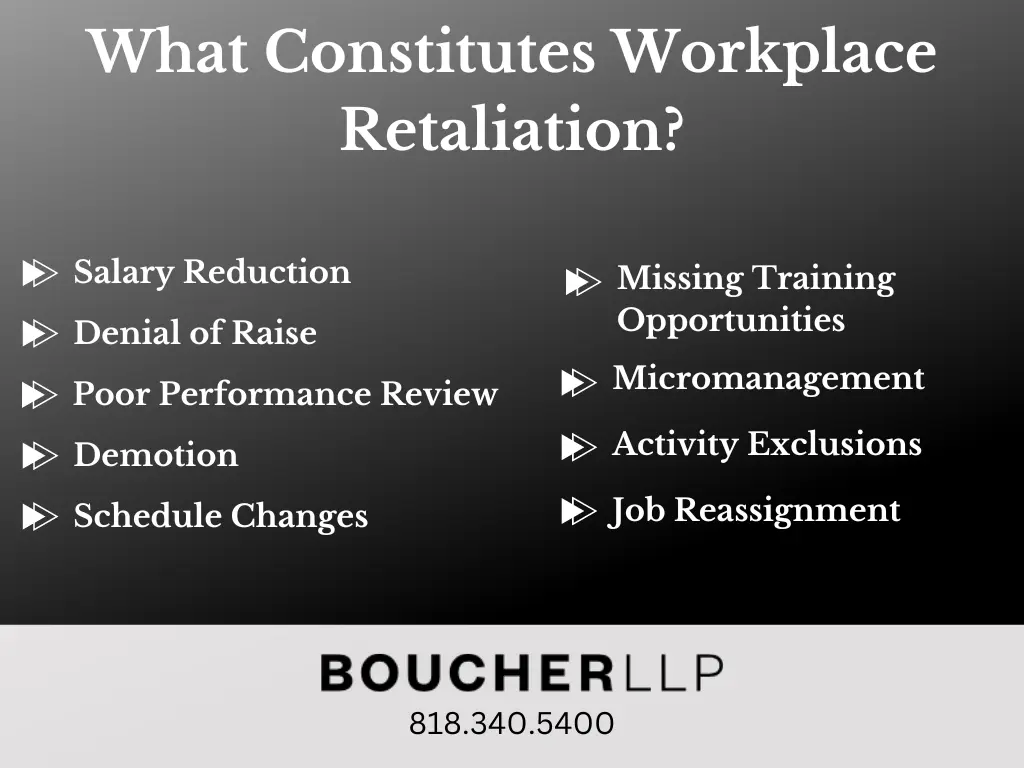Despite employees’ rights to a discrimination-free workplace, fear of retaliation often prevents people from coming forward. Just as there are laws against discrimination in the workplace, including sexual harassment, there are also laws against retaliation so it is essential to understand your rights.
What Constitutes Retaliation for Reporting Harassment?
The Civil Rights Act protects employees from not only sexual harassment in the workplace, but it also protects them from retaliation for a claim of harassment. Retaliation occurs when an employer takes action against an employee for reporting or complaining about sexual harassment or discrimination in the workplace, essentially punishing them for exercising their rights.
Multiple state and federal laws protect against retaliation and establish the rights of people who file complaints about unsafe workplaces, often called whistleblowers. It is important to consult with a qualified attorney about your specific circumstances, because retaliation for reporting harassment can take a variety of forms, including:
- Salary reduction,
- Denial of a raise,
- Poor performance review,
- Demotion,
- Missed training opportunities,
- Micromanagement,
- Exclusion from staff activities,
- Job reassignment, and
- Schedule changes.

It is important to note an employer may often argue that any of these actions were justified due to performance-related reasons or were simply coincidental. Some forms of retaliation may be blatant, while others may be less transparent.
A blatant form of retaliation may include a salary reduction without any reason or warning, whereas a more obscure act could consist of altering an employee’s schedule to include times the employer knows would be inconvenient. Furthermore, the retaliation for reporting harassment may be, depending on the act of retaliation, one isolated incident or a pattern of pervasive treatment in the workplace.
Laws Against Sexual Harassment and Retaliation
Sexual harassment in the workplace is a form of sex discrimination that violates Title VII of the Civil Rights Act of 1964 and California’s Fair Employment and Housing Act. Notably, the laws against retaliation still apply whether your sexual harassment claim was substantiated or not. If you have experienced sexual harassment or retaliation in California, there are two government agencies charged with protecting your rights and overseeing claims of discrimination.
The Equal Employment Opportunity Commission (EEOC) is the federal organization and the California Civil Rights Department (CRD), which requires employers with five or more employees to provide sexual harassment prevention training to all supervisory and nonsupervisory employees, is the state organization. In many cases, you must file a complaint with one of these two agencies before you may file a lawsuit.
Complaints filed with CRD or EEOC are automatically cross-filed with the other agency, so you only have to submit your complaint once. After the agency evaluates your complaint, your case may be accepted for investigation or you may be allowed to file your own lawsuit.
It is important to differentiate between sexual harassment and sexual abuse. The California Penal Code defines sexual abuse, also known as sexual battery, as unwanted touching of another person’s intimate parts and it has a separate legal process. It is possible to experience both sexual harassment and sexual abuse, in which case an attorney can help you determine the best legal course of action.
What Actions Can You Take If You Are Experiencing Retaliation for Reporting Harassment?
Victims of retaliation for reporting harassment may face numerous challenges in both their professional and personal lives. The impact of sexual harassment retaliation can be far-reaching, affecting an individual’s mental health, financial security, and overall well-being. Whether you are reporting on behalf of yourself or another employee, there are steps you can take to stand up for your right to a harassment-free workplace. The following suggestions are generally appropriate in most workplaces—you should consider your own circumstances and speak with a qualified attorney if you have any doubt about what steps to take.
Reporting to Human Resources
Not all companies have a human resources (HR) department to handle employee concerns. If your workplace does, contacting them directly is often an appropriate first step. In California, employers must take harassment and retaliation complaints seriously and conduct a thorough investigation to understand the issue. When reporting retaliation to HR, provide as much documented evidence as possible to establish a clear picture of the ongoing issues you are experiencing. Plan to follow up with your HR officer or manager to ensure the matter is adequately addressed.
Make an Official Report to a Government Agency
Both the CRD and EEOC are equipped to help you navigate issues regarding retaliation for a claim of harassment. Under California law, employers are required to demonstrate a legitimate reason for any adverse actions taken post-reporting. This requirement intends to discourage retaliation and promote a safe working environment where employees feel comfortable coming forward with complaints of harassment and discrimination when it occurs.
File a Lawsuit
In some cases, legal action may be the best remedy. Your attorney can help you determine if you have a valid claim for harassment, discrimination, or violations of the whistleblower law or any other activities that breach the Labor Code.
Contact Us
Sexual harassment can be a traumatic experience and many employees find it challenging to work up the courage to file a harassment report. Retaliation for asserting your rights can complicate the situation and make navigating the workplace even more difficult. Our team is committed to seeking justice and compensation for victims of sexual harassment. When you are ready to speak out, contact Boucher LLP. You do not have to go through this alone.